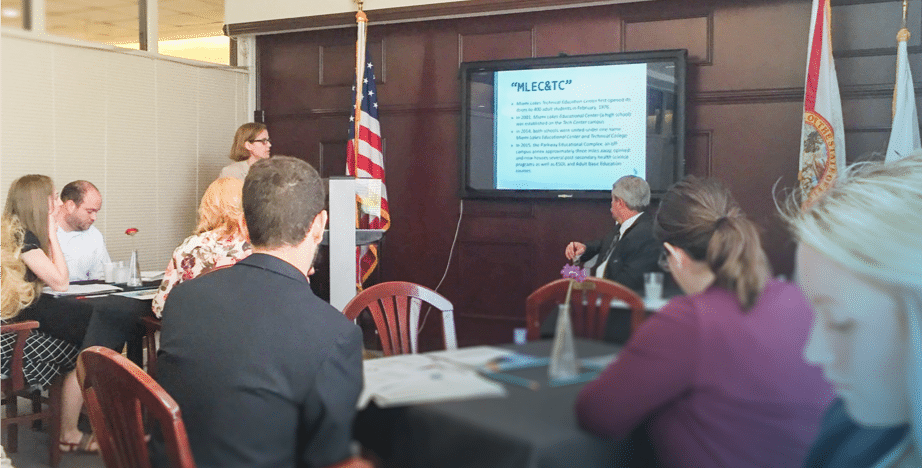Overview
Research has demonstrated that teacher quality and teacher preparedness are key factors to improving student achievement. In our continuous efforts to provide top quality education to all our nation’s students, we must also consider related efforts to improve our teacher pipeline, such as strengthening pathways into teaching (traditional and alternative); providing meaningful professional development, and focusing on measuring and improving educator effectiveness. This Congressional briefing covered current efforts to support the development of a strong teacher pipeline, and included presentations from Ed Crowe, former director Title II Teacher Quality Enhancement Program, as well as Arthur McKee, National Council on Teacher Quality.
In his presentation, Ed Crowe gave an overview of the federal role of the teacher pipeline. Noting the multitude of players and government agencies involved, Crow described current federal teacher recruitment initiatives in place, such as federal scholarships and loans, as well as programs ensuring accountability, such as the Higher Education Act Title II Report Card. Additionally, he commented on the historic change in the conceptualization of teacher effectiveness, moving away from simply a set of credentials accrued by an educator, to a more accurate focus on student performance and learning gains. Crow concluded by stressing the need for teacher preparation accountability, and pointed to shared standards among states and institutions, as well as multiple high-quality measures for teachers once they have entered into the classroom.
In the next presentation, Arthur McKee gave an overview of research being in the field of teacher preparation and effectiveness, and provided recommendations for future state and federal policy. McKee explained that current research suggests that after the first year in the classroom, the positive impact teachers have on student growth remains relatively consistent. He also reviewed research on teacher effectiveness based upon type of preparation (traditional training, alternative training, and no training), which found that all forms of teacher training provided virtually identical results for student growth. After mentioning NCTQ’s plans for a nation-wide review of teacher preparation programs, McKee suggested that in order to improve teacher effectiveness the federal government should provide funding for high-performing teacher preparation programs, issue state teacher preparation report cards, and research best practices, while states should strengthen their oversight practices, and require rigorous licensing tests that do not act as a rubber stamp for all teacher candidates.
Click here to view the event video!
Presenter Biographies
 Dr. Edward Crowe is Senior Adviser for the Teaching Fellows Program at the Woodrow Wilson National Fellowship Foundation. Crowe also provides consulting services on teacher quality, K-16 policy issues, and evaluation for several other organizations and projects.
Dr. Edward Crowe is Senior Adviser for the Teaching Fellows Program at the Woodrow Wilson National Fellowship Foundation. Crowe also provides consulting services on teacher quality, K-16 policy issues, and evaluation for several other organizations and projects.
Since 2001, Crowe has worked on projects related to teacher quality policy for the State Higher Education Executive Officers (SHEEO), and with the public higher education systems of Ohio, Pennsylvania, and Wisconsin; for the National Commission on Teaching and America’s Future (NCTAF) on teacher preparation projects, and on research on the cost of teacher turnover; as an adviser to the Hunter Foundation of Scotland and to the Scottish National Executive on teacher quality; has been a member of the Advisory Council for the Texas Center for Research, Evaluation and Advancement of Teacher Education (CREATE); and was a member of the national advisory panel for the Ohio Teacher Quality Partnership.
Crowe served as an evaluator for the New York City Partnership for Teacher Excellence, and wrote a commissioned paper for the Committee on Teacher Preparation Programs for the National Research Council (NRC). From 2002-2010, he was an adviser to the Carnegie Corporation of New York on implementation of the Teachers for a New Era initiative.
Ed was the first director of the Title II Teacher Quality Enhancement Program for the U.S. Department of Education. The Title II program awarded and supported over 90 competitive grants to states and to partnerships of universities and high need schools to improve the quality of teacher preparation policy and practice in the United States. He has extensive experience in state higher education policy, with the Office of the President of the University of North Carolina system, as senior staff to the state higher education coordinating board in Arkansas, and as senior manager of a statewide math and science education reform project funded by the National Science Foundation.
Dr. Crowe’s background and policy interests include higher education information systems,
K-16 policy initiatives, academic, finance and strategic planning issues in higher education, and teacher quality reform. Crowe is co-editor (with Dr. Rena Subotnik) of the forthcoming book series Levers of Change in Education, and recently published a chapter on “Teaching as a Profession” in the 2008 Handbook of Research in Teacher Education. In 2010, the Center for American Progress published his paper on teacher education accountability, Measuring What Matters: A Stronger Accountability Model for Teacher Education. In 2011, the Center published his paper, Race to the Top and Teacher Preparation: Analyzing State Strategies for Ensuring Real Accountability and Fostering Program Innovation. He is a graduate of Boston College and holds masters and doctoral degrees in political science from UNC-Chapel Hill.
 Arthur McKee joined NCTQ in January 2011 to head up its national review of education schools. From 2000 to 2010, Arthur worked at CityBridge Foundation, a family foundation dedicated to creating and sustaining great public schools in Washington DC. While there, he oversaw the foundation’s Early Years Education Initiative, an $8M, five-year effort to expand high-quality early childhood education services in the nation’s capital. Arthur received his AB in history from Princeton, and a Ph.D. in Russian history from U.C. Berkeley.
Arthur McKee joined NCTQ in January 2011 to head up its national review of education schools. From 2000 to 2010, Arthur worked at CityBridge Foundation, a family foundation dedicated to creating and sustaining great public schools in Washington DC. While there, he oversaw the foundation’s Early Years Education Initiative, an $8M, five-year effort to expand high-quality early childhood education services in the nation’s capital. Arthur received his AB in history from Princeton, and a Ph.D. in Russian history from U.C. Berkeley.
Click here to see Arthur McKee’s Powerpoint Presentation
Click here to see Ed Crowe’s Powerpoint Presentation
Glossary of Terms Related to the Teacher Pipeline
Teacher Pipeline Resource List
Presenter Information
Arthur McKee
Managing Director, Teacher Preparation Studies
National Council on Teacher Quality
202-393-0020 x114
amckee@nctq.org
#teacherprep
Edward Crowe
Senior Adviser
Woodrow Wilson National Fellowship Foundation
2801 Quebec Street, NW
Washington, DC 20008
202-489-4609
ed.crowe@verizon.net



